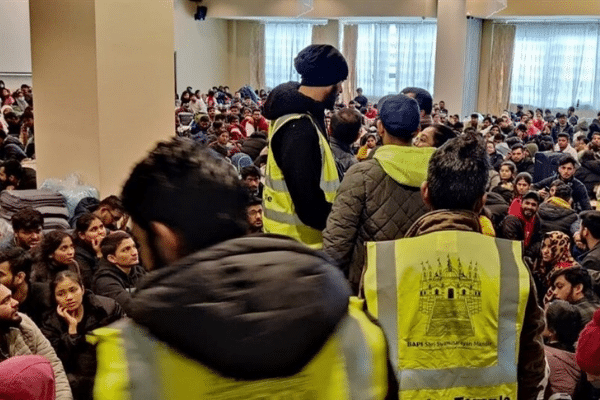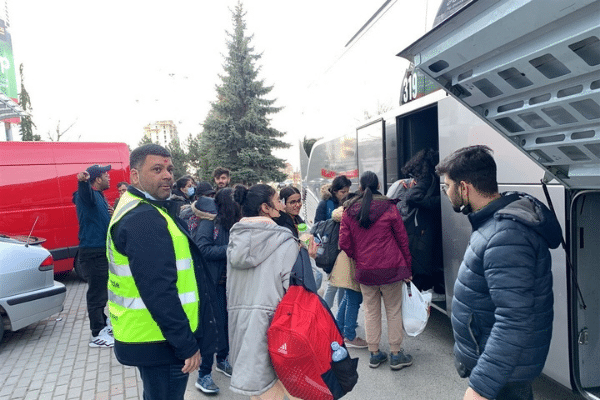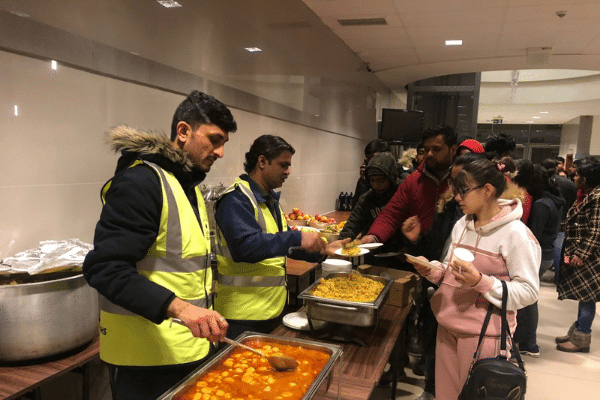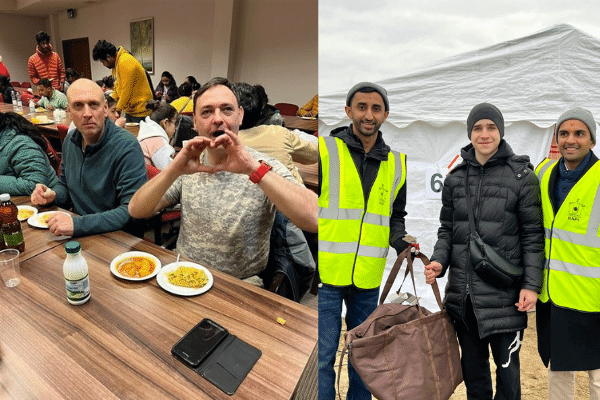An international cadre of volunteers of Indian-origin is on the frontlines of the refugee crisis in Poland helping people fleeing the destruction raining on Ukraine.
Speaking from Rzeszow in Poland, volunteer Yogi Trivedi said that they welcome the refugees coming across the border, help them with settling in and provide hot vegetarian meals, but more than all that, offer them emotional support for their trauma.
The mission organised by BAPS, as the Bochasanwasi Akshar Purushottam Swaminarayan Sanstha is popularly known by its acronym, has about 25 volunteers from the US, Britain, Ireland, France, Switzerland, Italy, Germany, Austria and Poland.
At the request of the Indian government, they worked initially with Indian students evacuating from Ukraine but their work has metamorphosised into a programme helping everyone fleeing the Russian onslaught.

India has repatriated most of the estimated 20,000 Indians who had been in Ukraine.
Once most of the students had been helped, “we realised that there were a tremendous number of Ukrainians (and) other immigrants coming in from that side and they didn’t have basic things that were necessary” like warm clothes while it was snowing in Poland, and proper food, he said.
UN Under-Secretary-General Rosemay DiCarlo said on Friday that the number refugees fleeing Ukraine had reached 2.5 million.
So, the team wearing their yellow vests with a sketch of the Akshardham temple in Gujarat moved on to help refugees of all nationalities at three border points, Budomierz, Korczowa and Medyka, said Trivedi, who is from New Jersey.
While the volunteers provided the refugees with essentials like warm clothes, gloves, sanitary supplies and hot meals, the volunteers found that what they needed the most was the “love and warmth that is necessary to recover from that trauma” of their wartime exodus, he said.
“Imagine”, he said: “If you’ve been travelling for seven, eight, nine days, from across the country, you’ve been walking. Often the lines at the crossings can can lead back to two to four kilometres at different checkpoints and they can take up several hours to cross.”
They are also bringing along “also emotional and sentimental trauma baggage, luggage”, he said.
“And when you come over to the Polish side, if there’s someone there to smile, give you a helping hand, carry your luggage, help you carry your kids, help you get settled, even if it’s for the first five, seven minutes … you could see the immense sort of stress and trauma melting away from their face.”

Many people from around the world offered to come and help but because the infrastructure could not support so many volunteers, they thought of a way to mobilise them to add a spiritual and emotional element to the relief effort.
The five volunteers from the US made a call on the BAPS Instagram page for people to upload 15-second videos of prayers for peace and good wishes for the refugees.
It is uplifting for the traumatised refugees to see thousands of people people praying for them and rooting for them, said Trivedi, an academic who has taught at Columbia University’s Graduate School of Journalism.
Although the prayers are also from Christians and Jews, most are from Hindus and are an introduction to the religion for many refugees.
When they played the videos, mothers would ask questions about Hinduism or their children would ask about the prayers, he said.
“We realised that the idea of ‘shanti’, the idea of ‘seva’, the idea of ‘bhakti’, the idea of equality, these are such universal Hindu traits and values that were being resonated through all of these prayers that were being shared by people from around the world were some things that Ukrainians were able to relate to, appreciate and admire,” Trivedi said.
Asked if the volunteers sensed any hostility because of their Indian background given the country’s neutrality, Trivedi said he hadn’t faced any.
“As soon as they heard the accent or they heard them speak, they realised that ‘Oh, maybe they’re American’, (and) I think any reservation, if they had any, would melt away,” he said of the volunteers’ interactions with Ukrainians and Poles.
“Everyone seemed fairly welcoming once they realised that our heart was in the right place, and that we were we were there to help.”

What motivates the volunteers?
Dharmik Sheth, a pharmacy professional from New Jersey who left behind his four-month-old child and wife to volunteer, recalled the words of Pramukh Swami Maharaj who built BAPS into a service-oriented international mega-organisation, “In the joy of others lies our own”.
Trivedi said that hearing those words made him realise “that I had to go there and do something for service. Seva is such an integral part of the value system, the Hindu theological system”.
“Personally, I feel that if I can serve any human being, it is like I am serving the Divine, I am getting closer to the Divine.”
Trivedi said that he “didn’t see” Ukrainians or Africans or Asians at the border, but he “saw images of my mother, my father, my cousins my nieces and nephews, my loved ones in their faces, and I realised that this was the best decision I needed”.
From Ukrainian refugees, Trivedi said that he learned lessons of resilience and humility.
“Despite all the difficulties they had, they were willing to keep on going and do it all for their children’s sake, and for their country’s sake”, he said.
He commended the welcome that the Poles � the military, the people and even children � gave the refugees.
“It was such a heartwarming sight to see that people come together instead of be divided in such difficult moments.”
IANS
READ ALSO: Indians volunteer to fight in Ukraine’s International Legion





